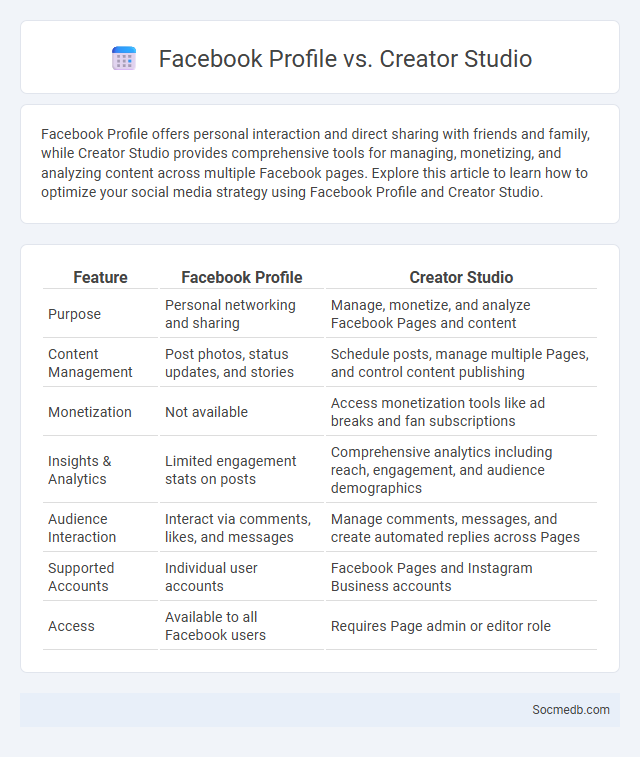
Photo illustration: Facebook Profile vs Creator Studio
Facebook Profile offers personal interaction and direct sharing with friends and family, while Creator Studio provides comprehensive tools for managing, monetizing, and analyzing content across multiple Facebook pages. Explore this article to learn how to optimize your social media strategy using Facebook Profile and Creator Studio.
Table of Comparison
| Feature | Facebook Profile | Creator Studio |
|---|---|---|
| Purpose | Personal networking and sharing | Manage, monetize, and analyze Facebook Pages and content |
| Content Management | Post photos, status updates, and stories | Schedule posts, manage multiple Pages, and control content publishing |
| Monetization | Not available | Access monetization tools like ad breaks and fan subscriptions |
| Insights & Analytics | Limited engagement stats on posts | Comprehensive analytics including reach, engagement, and audience demographics |
| Audience Interaction | Interact via comments, likes, and messages | Manage comments, messages, and create automated replies across Pages |
| Supported Accounts | Individual user accounts | Facebook Pages and Instagram Business accounts |
| Access | Available to all Facebook users | Requires Page admin or editor role |
Introduction: Understanding Facebook Profiles and Creator Studio
Facebook Profiles allow you to establish a personal or business identity, showcasing posts, photos, and connections to engage with your audience effectively. Creator Studio offers a comprehensive platform to manage, schedule, and analyze content across Facebook pages, enhancing your content strategy with in-depth insights. Understanding these tools helps optimize your social media presence, driving greater interaction and growth.
What is a Facebook Profile?
A Facebook profile is a personalized online space where users share information such as photos, interests, and updates with friends and followers. It includes sections like a timeline, about info, and friend list, enabling social connection and engagement. Profiles serve as digital identities facilitating communication, content sharing, and networking within the Facebook platform.
Overview of Facebook Creator Studio
Facebook Creator Studio offers a comprehensive platform for managing, scheduling, and analyzing content across your Facebook and Instagram accounts. With integrated tools for audience engagement, performance metrics, and monetization options, it streamlines content creation and distribution for creators and businesses. You can optimize your social media strategy by leveraging its detailed insights and easy-to-use management features.
Key Differences Between Profile and Creator Studio
Profile on social media primarily serves as an individual or business's public identity, displaying personal information, posts, and interactions. Creator Studio is a comprehensive dashboard designed for content management, offering tools to schedule posts, analyze performance metrics, and monetize content. Unlike a profile, Creator Studio centralizes content creation and insights, enhancing efficiency for social media management and strategy.
Features: Profile vs Creator Studio
Social media platforms offer distinct features tailored to user needs, with Profiles providing personalized feeds, connection options, and content sharing capabilities ideal for individual engagement. Creator Studio enhances content management through tools such as scheduled posting, detailed analytics, and monetization options, designed specifically for creators aiming to optimize audience reach and performance. These features collectively support diverse user goals, from social interaction to professional content creation and brand growth.
Best Uses: Personal vs Professional Management
Social media platforms serve distinct purposes in personal and professional management, with personal use centered on building connections, sharing life updates, and entertainment, while professional use targets networking, brand building, and industry insights. Effective personal social media management involves privacy settings, curated content, and authentic engagement, whereas professional management emphasizes consistent branding, strategic content marketing, and analytics tracking for performance improvement. Both uses benefit from platform-specific strategies on major networks like Facebook, LinkedIn, Instagram, and Twitter to optimize reach and interaction.
Privacy and Security Comparison
Social media platforms vary significantly in privacy and security measures, with encrypted messaging apps like Signal offering end-to-end encryption, while others such as Facebook collect extensive user data for targeted advertising. You should prioritize platforms with robust privacy policies, two-factor authentication, and clear data usage guidelines to protect your personal information. Understanding the differences helps you make informed decisions about which social networks align best with your security needs.
Monetization and Business Tools
Social media platforms offer powerful monetization features such as in-app purchases, ad revenue sharing, and subscription models that enhance your income potential. Business tools like analytics dashboards, targeted advertising, and content scheduling empower efficient audience engagement and data-driven marketing strategies. Leveraging these resources maximizes your brand visibility and revenue streams in the competitive digital landscape.
Content Creation and Scheduling Capabilities
Effective content creation and scheduling capabilities on social media platforms enable you to plan, design, and publish posts that engage your target audience consistently. Utilizing advanced tools like Canva or Buffer enhances visual storytelling while automating post timing increases reach during peak engagement periods. Optimizing these processes leads to higher brand visibility, audience growth, and better analytics for refining your content strategy.
Choosing the Right Platform for Your Needs
Selecting the ideal social media platform depends on your target audience, business goals, and content type. For visual-centric brands, Instagram and Pinterest offer strong engagement, while LinkedIn is optimal for B2B connections and professional networking. Analyzing platform demographics and user behavior ensures maximum reach and effective communication aligned with your objectives.
 socmedb.com
socmedb.com